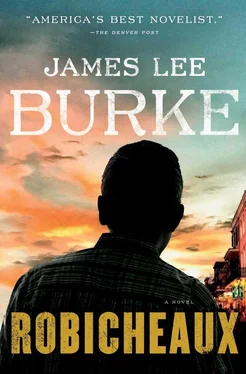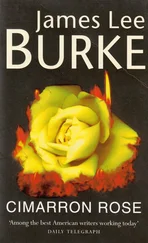But as with all parents, when I looked at Alafair, I saw the child and not the adult, as though she were incapable of growing older. I had a footlocker in the attic where I kept her Curious George and Baby Squanto Indian books, her Orca the Whale T-shirt, her Donald Duck hat with the quacking bill that we bought at Disneyland, and her pink tennis shoes embossed with “Left” and “Right” on the appropriate toes.
The leaves were floating from the trees and blowing on the street when I went to greet her. She was tall and lithe and had long Indian-black hair and brown eyes and an IQ that wasn’t measurable. Only two people in one million have it.
I carried her things into her bedroom, which I dusted and cleaned every week and kept closed and never let anyone use, not even Clete. After she put her things away, we went to the cemetery and placed flowers in a vase on Molly’s grave. I never talked about Molly’s death unless I had to, not even at the grave. I don’t believe that acceptance of mortality is a situation you resolve by talking with others. The same with personal grief and mourning or loss of any kind. I remember the words of a black ex-junkie musician friend of mine who got clean in a lockdown unit where he beat his head to pulp against a steel wall: “You deal wit’ your own snakes or you don’t, man. Sometimes you’re the only cat in the cathedral. Ain’t nobody else can do it for you.”
When we got home, I knew Alafair had read my thoughts.
“You bottle up your feelings, Dave,” she said. “I think that’s why you got drunk again.”
“Give it a rest, Alf.”
“You kept feeding your anger toward T. J. Dartez. What do they say at meetings? You get drunk at somebody?”
“Something like that.”
I started taking food out of the icebox. She had just gone to the heart of the matter. Every time I tried to remember what had happened after I’d seen the headlights in my rearview mirror, I reached the same conclusion, and it is the same conclusion every alcoholic reaches after he comes off a bender, sick and trembling and terrified: I had done something my conscious mind refused to accept.
“I haven’t quite told you everything,” I said. “I went after a guy by the name of Kevin Penny. He’s a violent man and a three-time loser who was going to hurt his kid.”
“What’d you do?”
“It involved a swimming lesson in the toilet bowl.”
Her eyes roved over my face. “What if he takes it out on his kid?”
“I called social services. They’re going to make home calls, and so is Clete.”
“Why do you have it in for this guy in particular?”
“I don’t know. He bothers me. I came within a few seconds of drowning him. I wanted to do it.”
I poured a glass of milk and drank it. She watched me silently. “He isn’t filing charges?” she asked.
“I had a bandana on my face.”
“Did somebody set you up on the Dartez deal?”
“Evidently, I called his house the night he was killed. I asked him to meet me out by Bayou Benoit.”
“That’s where he was killed?”
“Yes,” I said. I showed her my hands. They were scabbed over, the knuckles still swollen.
“Could you have punched a wall?”
“That’s what I’d like to believe.”
“Clete believes Fat Tony Nemo and Jimmy Nightingale and Levon Broussard may be mixed up in this,” she said.
“Clete and I are always trying to find excuses for each other.”
“He says you had dinner with Nightingale and Levon.”
“Nightingale got ahold of a sword carried by Levon’s great-grandfather in the Civil War and gave it to him. Nightingale wants to make a movie from one of Levon’s novels. Except Levon’s wife and Nightingale hit it off a little too well.”
“Nightingale thinks he’s going to produce a film with Levon? Where’s he been?”
“What do you mean?”
“Everyone knows Levon hates Hollywood. He thinks they screwed up a couple of his adaptations. On CNN he said Hollywood is a potential gold mine for anthropologists because it’s the only culture in the world where educated and rich and powerful people have the mind-set and manners of Southern white trash.”
“That’s not a bad line.”
I fixed avocado-and-tomato sandwiches for both of us and we sat down at the breakfast table by the window. I glanced through the screen. “Look yonder.”
“What?”
“There’s a coon on top of Tripod’s hutch.”
She leaned forward and peered through the screen. “I don’t see him.”
“He’s right there,” I said, pointing. “His tail is hanging down the side of the hutch.”
“I guess I need glasses.”
Since when? I wondered.
In the morning, I finally caught Levon Broussard’s physician in his office. His name was Melvin LeBlanc. He had been a navy corpsman during the first Iraqi war, and when he came home, he became a Quaker and enrolled in medical school at Tulane. He had the face of an ascetic, thinning, sandy hair, and a stare that gave you the sense that he saw presences others did not. We were sitting in his office with the door closed.
“I’m not keen on this kind of stuff, Dave,” he said.
“It’s too personal?”
“I don’t like to be used. That’s what the defense does. That’s what you guys do.”
“Rowena and Levon gave you carte blanche to tell us everything, didn’t they?” I said.
“I can tell you what I found or didn’t find. But don’t try to put words in my mouth.”
“Was there evidence of forced penetration?” I said.
“Around the vagina, no. There was a bruise inside one thigh.”
“A recent one?”
“Yes, sir.”
“No abrasions?”
“Abrasions where?”
“Wherever they might be significant, Melvin.”
“On the hip.”
“Scratches?”
“Correct.”
“Perhaps consistent with someone tearing an undergarment from a victim’s person?”
“I don’t know. I didn’t use the word ‘victim,’ either,” he said.
“Did you do any swabs?”
“Ms. Broussard showered after she returned home. I recommended she go to the hospital and have a rape kit done. She refused.”
“No trauma around the vagina?”
“None other than the bruise on the thigh.”
“How about inside?”
“She didn’t indicate any discomfort.”
“This isn’t coming together for me, Doc.”
“That’s your problem.”
“Ms. Broussard says the assailant sodomized her.”
“That’s a relative word,” he said.
“Not in this case.”
“If you’re asking about bite marks, there were none in the usual places.”
“How about elsewhere?”
“On the shoulder.”
“A bite mark?”
“What some call a hickey. It could have been put there before she went on the boat.”
“Is that why you didn’t mention it when I asked about abrasions?”
“Yes, sir.”
“Any other reason?” I asked.
“There were only two people on that boat. One is lying, the other is not. That’s about all I can tell you.”
“You think Rowena Broussard would deliberately put herself through this kind of embarrassment? Would any woman, at least one who’s sane?”
“Hell hath no fury,” he said.
“Not a good metaphor.”
“On the frontier, it was called cabin fever. Levon has a helium balloon for a head. His art comes first. He even tells people that at book signings. Some people want to save the world but don’t have time for their own family.”
“What are you saying, Doc?”
“The human spirit is frail. People believe whatever they need to believe. I feel sorry for all of them.”
That afternoon, Alafair was raking leaves in the backyard when she heard a vehicle come up the driveway and park under the porte cochere, as though the driver lived in the house. She walked around the side and saw a trim blond man get out of a red Honda that looked brand-new. He wore loafers and gray slacks and a long-sleeve purple shirt and a shiny black tie with a gold pin. His stomach was flat, his hair stiff with dressing of some kind, his hands big, the knuckles pronounced. He was holding a clipboard. “Hi. I’m Detective Spade Labiche. I work with Dave.”
Читать дальше












